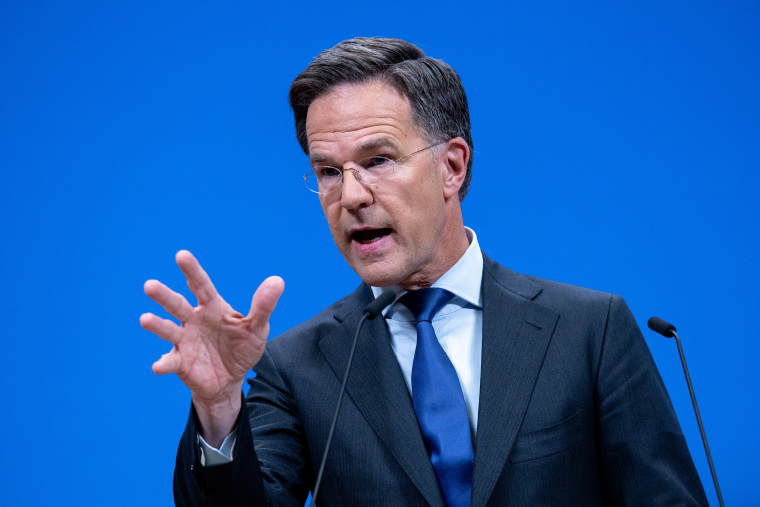-
Packers Insider Hints at Blockbuster Trade After Jaire Alexander Move - 17 mins ago
-
Azerbaijan vs. Hungary: How to watch, time, TV channel, streaming for International Friendly - 19 mins ago
-
Jared Leto on his other career: Investor - 21 mins ago
-
Union leader faces federal charge of conspiracy to impede an officer during L.A. ICE raids - 33 mins ago
-
Iowa woman allegedly killed her husband after he threatened to harm her and their dog - 35 mins ago
-
How One LA Restaurant Opened Its Doors to Injured Police During Protests - 59 mins ago
-
A taxing proposition – CBS News - about 1 hour ago
-
Sly Stone, funk music pioneer and Family Stone leader, dies at 82 - about 1 hour ago
-
2025 NFL odds: How will Aaron Rodgers, DK Metcalf mesh in Pittsburgh? - about 1 hour ago
-
L.A. City Council aide arrested on assault charge at anti-ICE protest - about 1 hour ago
NATO chief to urge four-fold boost to European defense spending
LONDON — Washington’s European allies must make a “quantum leap” in military spending to deter Russia, the head of NATO is expected to say Monday, calling for a 400% increase in the Continent’s air and missile defense budget.
NATO Secretary General Mark Rutte’s comments are set to be among the strongest yet from the organization as it attempts to improve Europe’s insufficient defenses against Russia while also avoiding the political ire of President Donald Trump.
“The fact is, we need a quantum leap in our collective defense,” Rutte is expected to say in a speech to the London-based think tank Chatham House, in remarks released beforehand by the alliance. “The fact is, we must have more forces and capabilities to implement our defense plans in full. The fact is, danger will not disappear even when the war in Ukraine ends.”
Trump’s clear signaling that he would like to at least significantly reduce decades of American military support for Europe has sent its nations scrambling to beef up their own arms industries.
Trump’s call for NATO allies to up their minimum defense spending from 2% to 5% of GDP was once seen as outlandish; but last month Rutte too backed this idea and said he expected it to be adopted at NATO’s June 24-25 summit.
On Monday he will make a similarly ambitious call, according to NATO’s pre-released remarks. He will ask for a “400% increase in air and missile defense” and add that “militaries also need thousands more armored vehicles and tanks, millions more artillery shells, and we must double our enabling capabilities, such as logistics, supply, transportation, and medical support.”
“Wishful thinking will not keep us safe,” he will say. “We cannot dream away the danger. Hope is not a strategy. So NATO has to become a stronger, fairer and more lethal alliance.”
Rutte’s speech comes against the backdrop of European powers vowing to spend more on their military budgets, having relied for decades upon America’s protection first against the Soviet Union and now Putin’s revanchist Kremlin.
NATO’s constituents must also maintain a balancing act when it comes to Ukraine, which is not a member. Kyiv’s allies want to support a neighbor it sees as a bulwark against Russian aggression, while keeping onside a White House increasingly sympathetic to Moscow’s worldview.
Trump has described his “very, very good relationship” with Putin, a man considered a pariah by former President Joe Biden and other Western leaders.
Many officials and analysts in Europe acknowledge that Trump is right to demand that wealthy nations such as Germany be able to look after themselves without Washington’s help.

However, many of these same commentators have expressed their horror at the tactics used by Trump, who has suggested that the United States would not protect underpaying allies and openly invited Russia to “do whatever the hell” it wants to them.
That risks shattering the central premise of NATO: Article 5 of its founding charter — an “all-for-one and one-for-all” mutual defense promise suggesting that if one ally is attacked, the rest would come to its aid.
The scenario the founders had in mind was that the U.S. would join the fight if Russia decided to launch an act of aggression against a smaller European country. In practice, however, the only time it has been used in the real world was the other way round, when the alliance lent Washington symbolic defensive help after 9/11.
Previous American presidents have always seen this as a good trade off: America underwrites European security, and in return has a huge influence over political, diplomatic and even cultural happenings on the continent and beyond. The soft power return on investment was always seen as a profitable one.
However, Trump has repeatedly questioned this logic, not only undermining the promise behind Article 5 but using hostile language against those historically considered Western brethren.
The realization among European allies that Washington is no longer committed to its mutual defense has sparked a drive to push up defense budgets and revive the long-since dormant arms industry on the continent.
Source link






























